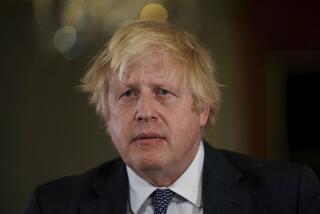Column:: With Brexit, Britain pulls the trigger — on itself

After Theresa May triggered Article 50 of the Lisbon Treaty, EU Council President Donald Tusk said “we miss you already.” (Sign up for our free video newsletter here http://bit.ly/2n6VKPR)
- Share via
Ever since June 23, when the British public cast a stunning, if narrow, vote to leave the European Union, many of Britain’s wiser and more thoughtful political and business leaders have been living in a state of wishful thinking, cherishing the hope that somehow, the decision to end 45 years of increasing integration with Europe would be abandoned or undone — an exit from Brexit, so to speak.
On Wednesday, that hope ended. British Prime Minister Theresa May put her signature to a letter invoking the EU’s Article 50, triggering an irreversible process of divorce and the start of at least two years of negotiations over terms. To the “remain” camp, those who opposed the split, the action is a self-inflicted wound of historic magnitude. To Brexit supporters, it’s the dawn of a new era of British economic supremacy, though they can’t quite define what that will look like. On the specifics, any sensible person would have to give the debate to the Remain side.
Few commentators put their case as succinctly as the editorial board of the firmly pro-Europe Observer newspaper, over the weekend. “Like sheep, the British people are being herded off a cliff,” the paper declared, “duped and misled by the most irresponsible, least trustworthy government in living memory.”
Car manufacturers are threatening to leave Britain, the Observer reported, as are banks and other institutions that earlier had turned London into the financial capital of Europe. Britain’s National Health Service will lose tens of thousands of doctors and nurses prompted to return to their home countries by the uncertainties of residency in a post-Brexit Britain.
Like sheep, the British people are being herded off a cliff, duped and misled by the most irresponsible, least trustworthy government in living memory.
— The Observer
To Brexit opponents, these were totally unnecessary developments. Brexit happened because its voters were caught up in a nationalistic spasm fostered by a few opportunistic leaders who had little expectation of succeeding, and therefore were unprepared for victory. The EU had become a generic, sloganized shorthand for bureaucracy, much like your local DMV in the U.S. Discontented voters gave little attention to the benefits of EU membership, and the country’s political establishment devoted little effort to emphasizing how much was at stake.
As a result, my colleague Shashank Bengali reported after the vote, communities that survived on EU resources voted to leave. They included Ebbw Vale, Wales, whose voters chose “leave” while served by a highway and rail line financed with European Union funds, as were job training programs, improvements to the town center and a new college. Meanwhile, promises made by the leave party have already been shown to have been lies. Within days of the vote, they were disavowing such promises that 350 million pounds ($435 million) would be newly available per week for the health service as soon as the EU fetters were removed.
Britain is just beginning to sense the consequences of trying to unravel an economic fabric that took more than four decades to knit. The British pound lost some 11.5% of its value against the U.S. dollar and the euro in the immediate aftermath of the vote, and never regained its footing. That has meant higher prices for British consumers for any foreign-sourced products, including food, gasoline, auto parts or clothing. The Daily Mirror documented inflationary prices in February for baked beans (up 9%), beer (up 4%) and bread (up as much as 5%).
London seems on the verge of ceding at least part of its financial supremacy to Paris; Frankfurt, Germany; or Dublin, Ireland; or a combination of all three. That’s because the “passport” that allowed firms located in London to trade in Europe without restrictions will end with Brexit, forcing firms to move at least part of their staffs to the mainland. Estimates of the job losses in Britain range from 75,000 to 232,000. Financial firms aren’t happy about the prospect themselves. “The clustering of financial services in London is hugely efficient for all of Europe,” JPMorgan Chase CEO Jamie Dimon told Bloomberg this month. “Now you’re going to have a de-clustering, which creates huge duplicative cost which is expensive to clients.” Nevertheless, he said, “we have no choice.”
Even more serious are the political ramifications. These include a fracturing of British union itself. Supporters of Scottish independence are preparing for a second referendum on the issue in the next year or so, anticipating a reversal of the result of a 2014 referendum in which Scottish voters elected to remain in Britain. That’s because Scotland voted decisively in the June referendum to remain in the EU. Its voters feel their interests have been trampled in Prime Minister May’s headlong sprint to trigger Article 50.
Another reason for unease is that no one has a clear idea how the divorce negotiations will unfold. Some sticking points are obvious, such as the EU’s demand that Britain fork over as much as 60 billion euros ($65 billion) to cover its prior budget commitments to the union before serious talks can start. Other principles dear to the EU idea but opposed by the British, such as the free movement of workers throughout the union, will be major obstacles to any new pact. In return for granting Britain some residual economic rights on the mainland, EU hard-liners are insisting that those principles continue to be honored.
Almost everyone agrees that this will be a negotiation like none other in European — perhaps world — history. “This is not a classical (trade) negotiation that starts from a situation where barriers exist and the objective is to bring them down,” observed Mogens Peter Carl, a former trade official for the European Commission, in a proposed blueprint for the talks. “With Brexit the situation is the reverse: we start with a situation of totally free trade and movement of people and capital, with the purpose of … doing what? Restricting one or the other, or both — and if so, to what extent?”
Critics of May’s government fault her for doing little to prepare for the talks, or for a Britain cut loose from the EU. During the years of union, Britain ceded regulation and management of large swaths of its economy to EU bureaucrats, allowing home-grown expertise to wither away. One employers group estimated that Britain would have to replace as many as 34 EU regulatory agencies with domestic versions, including those devoted to agriculture, transportation and energy, according to the Financial Times. “We simply don’t have the expertise,” one official said.
Brexit supporters defend the decision by observing that the gloomiest forecasts of a post-vote economic slump haven’t come true. Gross domestic product increased at about the same rate in the last quarter of 2016 as it had a year earlier, for example. But many economic forecasters predicted that the real damage was being staved off by residual doubts that Brexit would actually happen, and would emerge only after the divorce was triggered — as has now happened.
Some also observe, fairly, that Britain is not entirely without leverage in the coming talks. The EU still needs trade with Britain in some form, so it might not take the harshest position. Nor is the EU as unified as it seems on the surface; different member countries have different interests to protect in negotiations.
“Brexit does not spell disaster,” Carl said. “Far from it. It is the responsibility of governments to make these negotiations succeed, and quickly.”
Keep up to date with Michael Hiltzik. Follow @hiltzikm on Twitter, see his Facebook page, or email michael.hiltzik@latimes.com.
Return to Michael Hiltzik’s blog.
More to Read
Inside the business of entertainment
The Wide Shot brings you news, analysis and insights on everything from streaming wars to production — and what it all means for the future.
You may occasionally receive promotional content from the Los Angeles Times.











